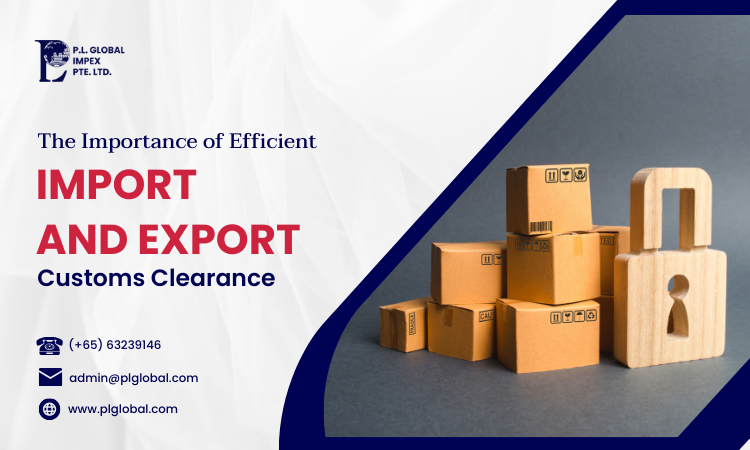Table of Contents
Introduction:
In today’s interconnected world, the import and export of goods and services play a crucial role in global trade. However, navigating the complexities of customs clearance can often be a daunting task for businesses of all sizes. This blog post will delve into the significance of efficient import and export customs clearance, exploring its impact on global trade and providing valuable insights to help businesses navigate this crucial process seamlessly.
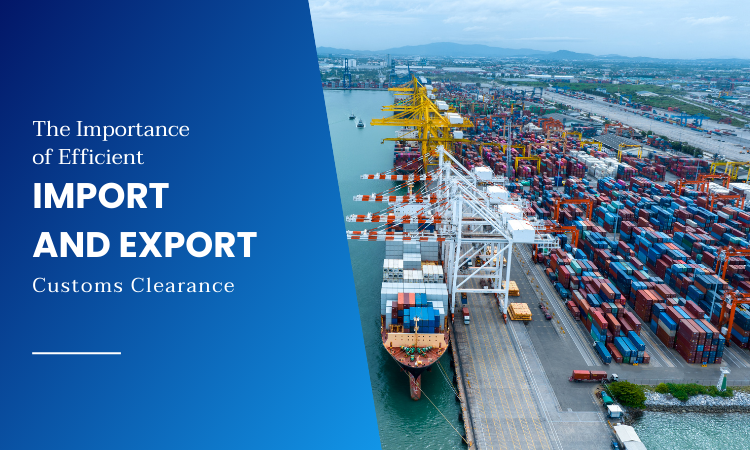
1. Navigating International Trade: The Importance of Efficient Import and Export Customs Clearance:
In today’s globalized economy, the seamless flow of goods and services across borders is crucial for businesses of all sizes. Whether you’re a seasoned exporter or a budding entrepreneur venturing into international trade for the first time, understanding the importance of efficient import and export customs clearance is vital for success.
Customs clearance refers to the process of ensuring your goods comply with all relevant regulations and duties before they can be legally imported or exported. This seemingly mundane step plays a critical role in facilitating international trade and protecting national interests.
Efficient customs clearance offers several significant advantages:
- Reduced Costs: Streamlined clearance processes minimize delays and storage fees associated with goods stuck in customs.
- Enhanced Speed and Reliability: Faster clearance times translate to quicker product delivery, improving customer satisfaction and competitiveness.
- Mitigated Risks: Proper documentation and adherence to regulations minimize the risk of penalties and potential cargo seizure.
However, navigating the complexities of customs clearance can be challenging. Understanding the specific requirements for importing and exporting goods, as well as staying updated on fluctuating regulations, can be a time-consuming endeavor. This is where utilizing the expertise of a customs broker can prove invaluable.
A qualified customs broker possesses the knowledge and experience to guide you through the entire process, ensuring accurate documentation, classification of goods, and adherence to all necessary procedures. This not only saves you valuable time and resources but also minimizes the risk of errors that could lead to delays and penalties.
By prioritizing efficient import and export customs clearance, businesses can unlock a world of global opportunities. From expanding their customer base to accessing new markets and securing competitive pricing, the benefits of seamless international trade are undeniable. In the following sections, we will delve deeper into the specific steps involved in import and export customs clearance, providing practical tips and resources to help you navigate this crucial process with confidence.
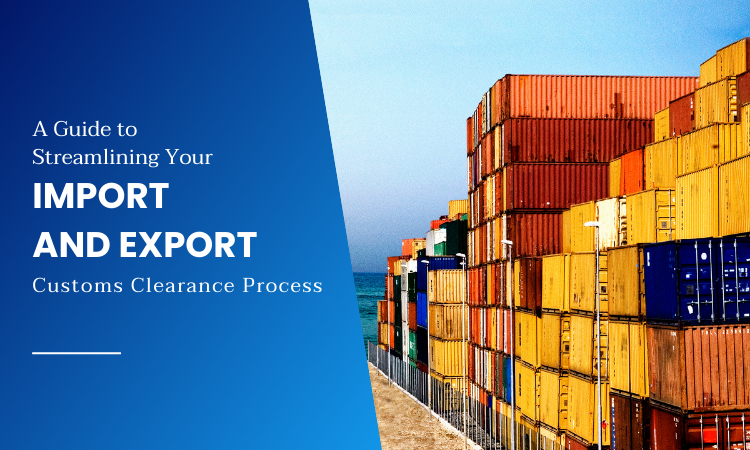
2. Navigating the Maze: A Guide to Streamlining Your Import Export Customs Clearance Process:
The world of import and export customs clearance can often resemble a complex maze, filled with intricate regulations and potential pitfalls. For businesses venturing into international trade, navigating this process efficiently can be the key to unlocking global opportunities and avoiding costly delays.
Here are some key steps to help you streamline your import and export customs clearance process:
Understand Your Responsibilities:
As the importer or exporter, you are ultimately responsible for ensuring your goods comply with all relevant regulations and duties. Familiarize yourself with the specific requirements for the goods you are importing or exporting, including any necessary permits or licenses.
Prepare Accurate Documentation:
Ensure you have all the necessary documentation in place, including commercial invoices, packing lists, certificates of origin, and any other required permits or licenses. Accuracy and completeness are crucial to avoid delays and potential holdups.
Classify Your Goods Correctly:
The classification of your goods determines the applicable duty rate. Misclassification can lead to significant penalties, so ensure you understand the Harmonized System (HS) code for your goods. Consulting a customs broker or utilizing online resources can be helpful in this regard.
Stay Informed:
Customs regulations and procedures can change frequently. Stay updated on any relevant changes and amendments to ensure your compliance and avoid unnecessary delays due to outdated information.
Consider Utilizing a Customs Broker:
Partnering with a licensed customs broker can significantly simplify the process. They possess the expertise to navigate the complexities of customs regulations, ensuring accurate documentation, classification, and adherence to all necessary procedures. This can save you valuable time and resources, allowing you to focus on your core business activities.
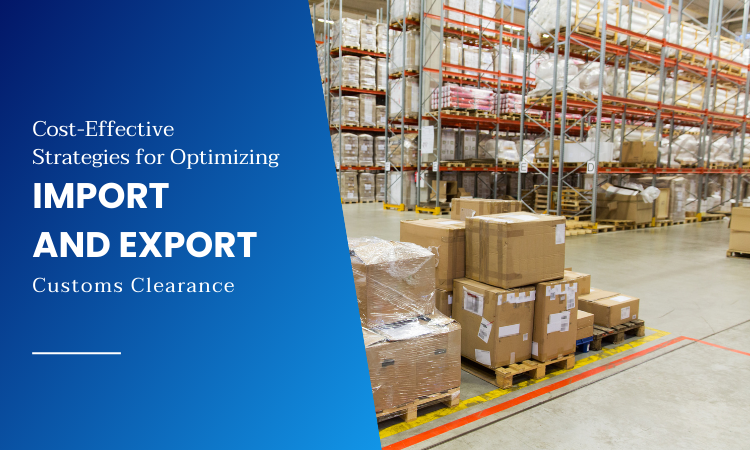
3. Cost-Effective Strategies for Optimizing Import and Export Customs Clearance:
While efficient import and export customs clearance are crucial for international trade, navigating the process can also be a cost concern. However, by implementing strategic measures, businesses can significantly optimize their customs clearance procedures and minimize associated expenses.
Leverage Technology:
Many customs authorities offer online platforms for submitting documentation and tracking shipments. Utilizing these tools can streamline the process, reduce reliance on paper-based systems, and potentially expedite clearance times.
Consolidate Shipments:
When possible, consolidating smaller shipments into larger ones can often result in lower transportation and customs clearance costs per unit. This is particularly beneficial for businesses frequently importing or exporting smaller quantities of goods.
Choose the Right Transportation Mode:
Consider the cost-effectiveness of different transportation modes based on the urgency and value of your goods. While air freight might be faster, sea freight can be significantly cheaper for bulkier or less time-sensitive shipments.
Partner with a Reputable Customs Broker:
While their services involve a fee, a qualified customs broker can significantly reduce your overall costs by ensuring efficient and error-free documentation, minimizing the risk of delays and penalties, and potentially negotiating favorable duty rates for your goods.
Maintain Accurate Records:
Meticulously maintaining accurate records of your import and export activities can simplify future transactions and audits. This can save you time and resources that might otherwise be spent rectifying errors or retrieving missing information.
4. Customs Clearance Demystified: Understanding the Requirements for Importing and Exporting Goods:
So, you’re venturing into the exciting world of international trade! Whether you’re an experienced importer or a curious entrepreneur taking your first steps, understanding the requirements for import and export customs clearance is vital for a smooth and successful journey.
Customs clearance refers to the process of ensuring your goods comply with all relevant regulations and duties before they can legally enter or leave a country. This seemingly complex process plays a critical role in facilitating international trade while protecting national security and economic interests.
Here’s a breakdown of the key requirements for both importing and exporting goods:
Importing:
- Accurate Documentation: Prepare all necessary documents, including a commercial invoice, packing list, bill of lading, certificate of origin, and any required permits or licenses.
- Duty and Tax Payment: Be prepared to pay any applicable import duties and taxes, which are calculated based on the value and classification of your goods.
- Compliance with Regulations: Ensure your goods comply with all relevant regulations, including safety standards, labeling requirements, and any applicable import restrictions.
Exporting:
- Export License: Certain goods may require an export license before they can be shipped out of the country.
- Export Declaration: You need to electronically declare your export shipment to the customs authorities, providing details about the goods and their destination.
- Export Control Regulations: Understand and comply with any export control regulations that may apply to your goods, especially for items with potential national security implications.
It’s important to note that these are general requirements, and specific details may vary depending on the countries involved and the nature of the goods being imported or exported. Consulting your local customs authority or a qualified customs broker can provide you with the most up-to-date and accurate information for your specific situation.
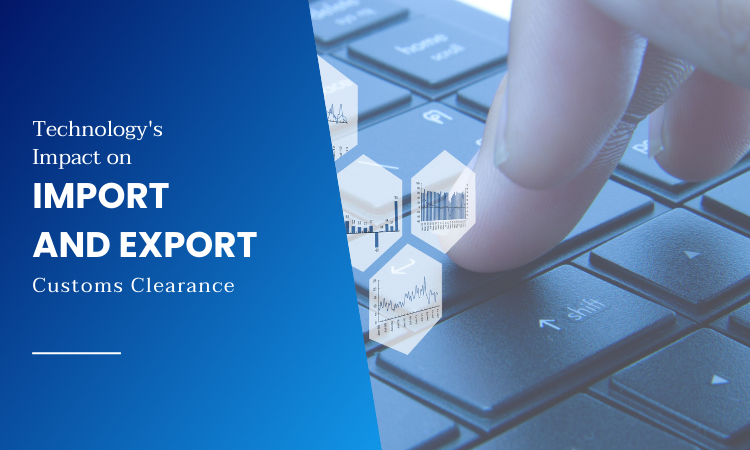
5. Technology's Impact on Import Export Customs Clearance: Simplifying the Process for Businesses:
The world of import and export customs clearance has undergone a significant transformation in recent years, largely driven by the ever-evolving landscape of technology. These advancements are simplifying the process for businesses, leading to faster clearance times, reduced costs, and increased efficiency.
Here are some key ways technology is impacting import and export customs clearance:
Online Platforms:
Many customs authorities now offer online platforms for submitting documentation electronically. This eliminates the need for paper-based submissions, streamlining the process and reducing the risk of errors or delays due to missing or misplaced documents.
Automated Clearance Systems:
Advanced automated systems can analyze customs declarations and supporting documents, helping to identify inconsistencies and expedite clearance for low-risk shipments. This frees up customs officials to focus on more complex cases, further improving overall efficiency.
Real-Time Tracking and Monitoring:
Businesses can now track the status of their shipments in real-time using online portals. This transparency empowers them to anticipate potential delays and make informed decisions regarding logistics and inventory management.
Data Analytics and Risk Management:
Customs authorities are increasingly leveraging data analytics to identify high-risk shipments and target their resources more effectively. This allows for smoother clearance for low-risk shipments while safeguarding national security and economic interests.
The impact of technology extends beyond government agencies. Businesses can utilize various software solutions to simplify their own customs clearance processes. These solutions can be useful for the following tasks:
- Classification of goods: Ensure accurate classification by referencing online databases and leveraging AI-powered tools.
- Duty and tax calculation: Utilize software to calculate applicable duties and taxes based on the specific details of your shipment.
- Document preparation: Generate standardized and compliant electronic documentation, reducing errors and streamlining the process.
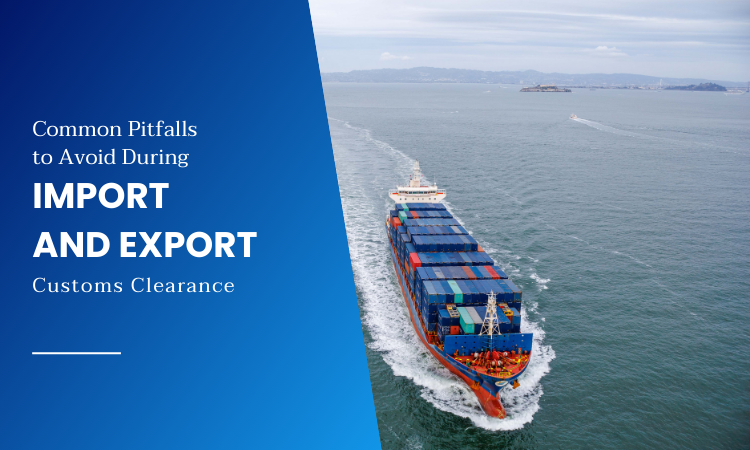
6. Common Pitfalls to Avoid During Import and Export Customs Clearance:
While the thrill of venturing into international trade is undeniable, navigating the intricacies of import and export customs clearance can be daunting. Even seemingly minor errors can lead to significant delays, penalties, and financial losses. By being aware of these common pitfalls, businesses can ensure a smoother and more efficient customs clearance process.
Inaccurate Documentation:
One of the most common pitfalls is inaccurate or incomplete documentation. Ensure all necessary documents, such as commercial invoices, packing lists, certificates of origin, and permits, are accurate, complete, and up-to-date. Even a seemingly minor discrepancy can lead to delays and potential investigations.
Misclassification of Goods:
Incorrectly classifying your goods can lead to significant errors in duty calculations and potential penalties. Familiarize yourself with the Harmonized System (HS) code system and ensure your goods are classified accurately under the appropriate code. Consulting a qualified customs broker can be invaluable in this regard.
Failing to Consider Duty and Tax Costs:
Be prepared to pay the applicable import duties and taxes, which are calculated based on the value and classification of your goods. Failing to factor in these costs can lead to unexpected cash flow issues and disrupt your business operations.
Ignoring Export Control Regulations:
Certain goods may require export licenses or be subject to specific controls due to national security concerns. Failing to comply with these regulations can result in delays, seizures, and even criminal charges.
Neglecting the Importance of Deadlines:
Customs clearance processes have deadlines that must be met to avoid penalties and potential storage fees. Stay organized, track deadlines, and submit all required documents well in advance to ensure a smooth and timely clearance process.
Not Utilizing a Customs Broker:
For businesses unfamiliar with the complexities of customs regulations, partnering with a licensed customs broker can be a wise investment. Their expertise can help navigate the process effectively, minimize the risk of errors, and ensure compliance with all relevant regulations.
7. The Future of Import Export Customs Clearance: Embracing Automation and Efficiency:
The landscape of import and export customs clearance is undergoing a transformative shift, driven by relentless technological advancements. As we move forward, the future promises a world of greater automation and efficiency, streamlining the process for businesses and facilitating seamless international trade.
Here’s a glimpse into what the future holds for import and export customs clearance:
Enhanced Automation:
Repetitive and manual tasks associated with customs clearance are primed for automation. Advanced technologies like Artificial Intelligence (AI) and machine learning will play a crucial role in automating data entry, document verification, and risk assessment, freeing up customs officials to focus on complex cases and strategic activities.
Seamless Data Sharing:
Secure and efficient data exchange between businesses, customs agencies, and other stakeholders will become increasingly prevalent. This will involve utilizing blockchain technology and standardized data formats, enabling real-time tracking of shipments and facilitating faster clearance processes.
Risk-Based Targeting:
Leveraging advanced data analytics, customs authorities will be able to implement more sophisticated risk-based targeting strategies. This will allow them to focus their resources on high-risk shipments while expediting clearance for low-risk ones, creating a more efficient and streamlined process for compliant businesses.
Increased Transparency and Visibility:
Businesses and consumers will benefit from greater transparency and visibility throughout the entire customs clearance journey. Real-time tracking of shipments and access to clear communication channels will enhance the overall experience for all parties involved.
Evolving Role of Customs Brokers:
As automation becomes more prevalent, the role of customs brokers is likely to evolve. They will increasingly focus on providing strategic guidance, complex case management, and specialized expertise to navigate the evolving regulatory landscape, ensuring continued compliance and efficient trade for their clients.
8. The Essential Guide to Import Customs Clearance: Ensuring a Smooth Delivery:
Importing goods presents exciting opportunities for businesses, but navigating the world of customs clearance can feel like a daunting task. However, with proper preparation and knowledge, you can ensure a smooth delivery for your imported goods. This essential guide will equip you with the crucial information you need to navigate import customs clearance with confidence.
Understand Your Responsibilities:
As the importer, you are ultimately responsible for ensuring your goods comply with all relevant regulations and duties. Familiarize yourself with the specific requirements for your imported goods, including any permits or licenses required for specific categories.
Prepare Accurate Documentation:
Meticulously gather and ensure the accuracy of all necessary documentation, including a commercial invoice, packing list, bill of lading, certificate of origin, and any required permits or licenses. Incomplete or inaccurate documents are a leading cause of delays and potential penalties.
Classify Your Goods Correctly:
The classification of your goods determines the applicable duty rate. Misclassification can lead to significant penalties, so ensure you understand the Harmonized System (HS) code for your goods. Consulting a customs broker or utilizing online resources can be helpful in this regard.
Consider Utilizing a Customs Broker:
Partnering with a licensed customs broker can significantly simplify the process. Their expertise can streamline documentation, classification, and ensure adherence to all necessary procedures, saving you valuable time and resources while minimizing the risk of errors or delays.
Track Your Shipment:
Many customs authorities and shipping providers offer online platforms for tracking your shipment’s progress through the clearance process. This allows you to anticipate potential delays and plan accordingly.
Pay Applicable Duties and Taxes:
Be prepared to pay any applicable import duties and taxes, which are calculated based on the value and classification of your goods. Understanding these costs beforehand allows for better budgeting and avoids post-clearance financial surprises.
9. Exporting Success: How Efficient Customs Clearance Can Boost Your Business:
In today’s globalized marketplace, venturing into international trade opens doors to exciting opportunities for businesses of all sizes. However, navigating the intricacies of export customs clearance can often pose a hurdle, causing delays and hindering your export journey.
This is where achieving efficient customs clearance becomes crucial. By streamlining this process, you can unlock several key benefits that can significantly boost your business:
Reduced Costs:
Efficient clearance translates to faster shipment movement, minimizing storage fees and potential demurrage charges associated with delays in clearing customs. This translates to a more cost-effective export operation.
Enhanced Customer Satisfaction:
Faster delivery times through efficient clearance lead to happier customers. By fulfilling international orders promptly, you build trust and loyalty, fostering positive brand reputation and repeat business.
Increased Competitiveness:
Quick and efficient clearance allows you to react faster to market opportunities and respond to customer demands swiftly. This agility gives you a competitive edge compared to businesses facing delays in exporting their goods.
Improved Cash Flow:
Faster clearance translates to quicker payment collections from international buyers. This improves your cash flow, allowing you to reinvest in business growth and expansion endeavors.
Mitigated Risks:
Streamlined clearance minimizes the risk of errors and non-compliance, reducing the possibility of penalties, fines, or even shipment seizures. This ensures a safer and more predictable export experience.
Achieving Efficient Clearance:
Partnering with a qualified customs broker can significantly simplify the process. Their expertise ensures accurate documentation, classification of goods, and adherence to all necessary regulations. Additionally, staying informed about changing regulations and utilizing technological solutions for documentation and tracking can further enhance the efficiency of your export customs clearance process.
By prioritizing efficient export customs clearance, you unlock a world of potential for your business. From reduced costs and improved customer satisfaction to increased competitiveness and a safer export environment, the benefits are undeniable. So, invest in streamlining your customs clearance process and watch your export endeavors soar to new heights!
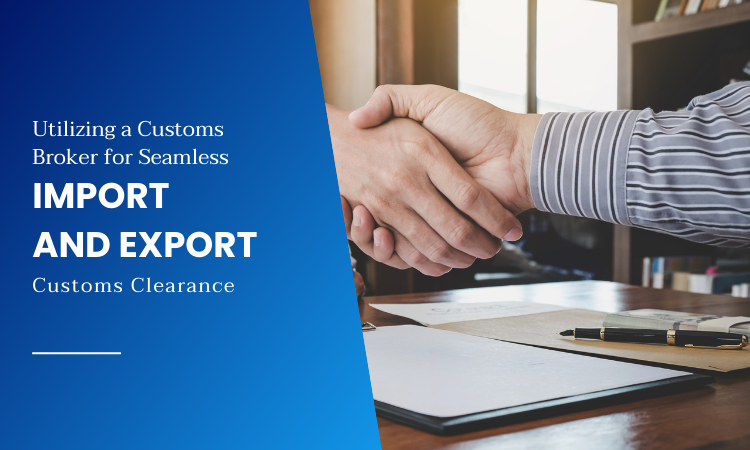
10. Partnering for Success: Utilizing a Customs Broker for Seamless Import and Export Clearance:
Navigating the complexities of import and export customs clearance can be a daunting task for businesses, especially those new to international trade. The intricate regulations, ever-changing requirements, and potential for costly delays can significantly hinder your journey towards global success. This is where partnering with a licensed customs broker can prove invaluable.
A qualified customs broker acts as your trusted advisor and guide throughout the import and export customs clearance process. Here’s how they can help you achieve seamless clearance and business success:
Expertise and Knowledge:
Customs brokers possess in-depth knowledge of import and export regulations, procedures, and HS classification systems. They stay updated on the latest changes and ensure your shipments comply with all relevant requirements, minimizing the risk of delays and penalties.
Streamlined Documentation:
Preparing accurate and complete documentation is crucial for smooth clearance. Customs brokers can efficiently handle this complex task, ensuring all necessary documents are present, accurate, and filed correctly.
Classification Accuracy:
Proper classification of your goods determines the applicable duty rates. Customs brokers possess the expertise to accurately classify your goods under the appropriate HS code, saving you from costly misclassification errors.
Risk Management and Compliance:
They can identify potential risks associated with your shipment and implement strategies to mitigate them. This proactive approach ensures your goods comply with all regulations, safeguarding your business from legal repercussions.
Efficient Clearance and Cost Savings:
Their experience and knowledge of efficient clearance procedures can expedite the process, minimizing storage fees and demurrage charges. Additionally, they can help you identify potential cost-saving strategies, like duty optimization, to improve your bottom line.
Communication and Advocacy:
Customs brokers act as a bridge between your business and customs authorities. They can effectively communicate on your behalf, clarify any issues, and advocate for your interests during the clearance process.
Conclusion:
Efficient import and export customs clearance plays a pivotal role in facilitating international trade and unlocking a world of global opportunities for businesses. By understanding its significance, implementing the strategies outlined in this blog series, and potentially partnering with a qualified customs broker, you can navigate the complexities of customs clearance with confidence and pave the way for a successful journey towards your international trade goals.


